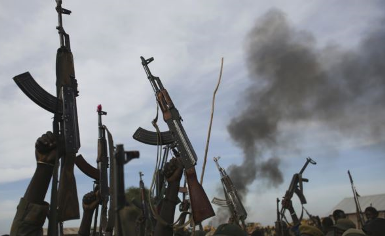Fresh fighting in Upper Nile threatens to derail S. Sudan peace process
September 20, 2014 (ADDIS ABABA) – The Intergovernmental Authority on Development (IGAD) has condemned a renewed outbreak of fighting between South Sudan’s warring parties in Upper Nile, warning it could jeopardise the latest round of peace talks.

IGAD’s chief negotiator, Seyoum Mesfin, claimed the fighting was a deliberate act aimed to disrupt the latest round of peace talks.
The former Ethiopian foreign minister expressed regret over the latest development, urging both rival parties to remain calm and exercise restraint.
“It is unfortunate that this trend of events has been observed every time a new session of talks begins and any such sideshows aimed at derailing the peace process will not be tolerated,” said Mesfin.
Mesfin urged the two sides to adhere to all the agreements previously signed, particularly the January cessation of hostilities agreement.
REBELS REPULSE ATTACKS
Meanwhile, rebel spokesperson Brig. Gen. Lul Ruai Koang told Sudan Tribune on Saturday that rebel forces had repulsed a series of attacks from pro-government troops over the weekend.
He claims pro-governments troops attacked their positions with the intent to occupy rebel-controlled areas, adding that fighting remained ongoing and was advancing towards oil fields in Renk county.
“Our forces have captured nine areas between Friday and Saturday and still more fighting is going on toward Renk and Malakal towns,” said Koang in an interview with Sudan Tribune on Saturday.
According to Koang, rebels had subsequently captured four areas on Friday and another five on Saturday after heavy clashes broke out in and around Nasir area, south of Malakal.
Koang has downplayed the number causalities on both sides in the latest outbreak of violence, saying it was unclear how many were wounded as fighting remained ongoing.
Residents at a camp for internally displaced people in Malakal town reported hearing gun shots to the south and north-west of the capital.
“Since yesterday (Friday) we could hear heavy gun firing in different directions of the area,” said one resident told Sudan Tribune.
“We could not tell who is attacking who as it has been the behaviour of the warring parties to trade one another when fighting resumes.”
Camp residents have called on warring parties to refrain from further fighting, urging them to give negotiations a chance to resume and allow peace to return to conflict-affected areas.
IGAD TO INVESTIGATE
Mesfin said IGAD Monitoring and Verification Teams will immediately investigate the latest outbreak of violence, warning those violating the ceasefire agreement would be exposed.
IGAD leaders, including Ethiopia’s prime minister, have previously blamed rebels for violating the terms of ceasefire arrangements.
However, the opposition group continues to accuse IGAD mediators of favouring president Salva Kiir rather than addressing the root causes of the conflicts.
Koang claims government forces triggered the latest outbreak of violence after launching an offensive on rebel-controlled areas in violation of the ceasefire deal.
He says the Juba government lacked credibility to negotiate and was simply buying time to delay peace talks.
Comprising largely of ethnic militias and dissident soldiers, rebel forces aligned with former vice-president Riek Machar have been engaged in a brutal armed struggle with the government after a split in the country ruling party (SPLM) turned violent in mid-December last year.
IGAD has repeatedly warned that it is prepared to take punitive measures against parties found to be obstructing the peace process.
Proposed measures include blocking parties from participating in future governance arrangements in the country.
The latest violence comes after the signing of an implementation matrix for the cessation of hostilities agreement on 25 August.
Fighting in South Sudan has killed thousands while some 1.8 million have been displaced, sparking a major humanitarian crisis in the young nation.
Kiir has repeatedly accused Machar and his supporters of staging an attempted coup to overthrow the government – an allegation the latter denies and which has not been backed by the international community.
IGAD-led peace talks have been hampered by ongoing delays and have also come under criticism for failing to reach a negotiated political settlement to the crisis.
(ST)
